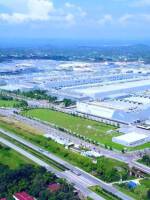
Mekong Delta – Coordination between government, businesses, scientists and people is a key factor to realize the goal of net zero emissions by 2050. That was the opinion given by Chairman of Can Tho City People’s Committee Tran Viet Truong at the Forum on Building a Sustainable Agricultural Ecosystem towards the goal of Net Zero (net zero emissions) by 2050 held on December 19 in Can Tho City.
According to information from the forum, in Vietnam, agriculture is not only a sector strongly affected by climate change but also generates huge greenhouse gas emissions.
In the “National Climate and Development Report for Vietnam”, the World Bank said that agriculture is the second largest greenhouse gas emitter in Vietnam, accounting for about 19% of total emissions in 2020. Accordingly, rice production accounts for about 48%, livestock 15.3%, synthetic fertilizer use 12.9% and manure treatment 9.5% of emissions.

Speaking at the forum, Chairman of Can Tho City People’s Committee Tran Viet Truong emphasized that converting the model towards ecological, organic, circular and low-emission agriculture is the top priority choice, an opportunity for strong transformation for Vietnam’s agricultural sector in general and the Mekong Delta in particular.
In the process of building a sustainable agricultural ecosystem towards the goal of Net Zero by 2050, the formation and development of agricultural value chains play a key role. Sustainable value chains not only include production, but also extend from processing, preservation to product consumption.

According to Mr. Vo Tan Thanh – Vice President of the Vietnam Federation of Commerce and Industry (VCCI), one of the breakthrough solutions to reduce emissions is to apply the carbon credit model. This is not only a tool to promote emission reduction but also creates a new source of income for farmers.
“Sustainable agricultural models such as mulberry cultivation and silkworm raising in Lao Cai or Vinh Phuc are clear evidence of the effectiveness of combining green production with economic benefits. We expect the Mekong Delta, as the country’s largest rice granary, to continue to pioneer in developing Net Zero agricultural models,” said Mr. Thanh.
To achieve the Net Zero goal by 2050, Mr. Thanh said, it is impossible to rely on just one individual or organization. This is a joint effort of the government, businesses, the scientific community and farmers.


At the forum, representatives of leaders of provinces and cities: Can Tho, Tra Vinh, Dong Thap, Long An…, managers, experts, business associations, entrepreneurs discussed, suggested solutions, proposed solutions to build a sustainable agricultural ecosystem towards the goal of Net Zero by 2050.
To support farmers in agricultural production to adapt to climate change, reduce emissions and move towards the Net Zero target, relevant ministries and sectors need to develop specific guiding criteria. The application of technology, transformation of production methods, combined with the carbon credit mechanism will be the key to sustainable development of Vietnamese agriculture and response to climate change…
Mỹ Ly





[…] Mr. Vo Tan Thanh – Vice President of Vietnam Federation of Commerce and Industry – at the Forum on Building a Sustainable Agricultural Ecosystem towards the goal of Net Zero by 2050 recently held in Can Tho […]